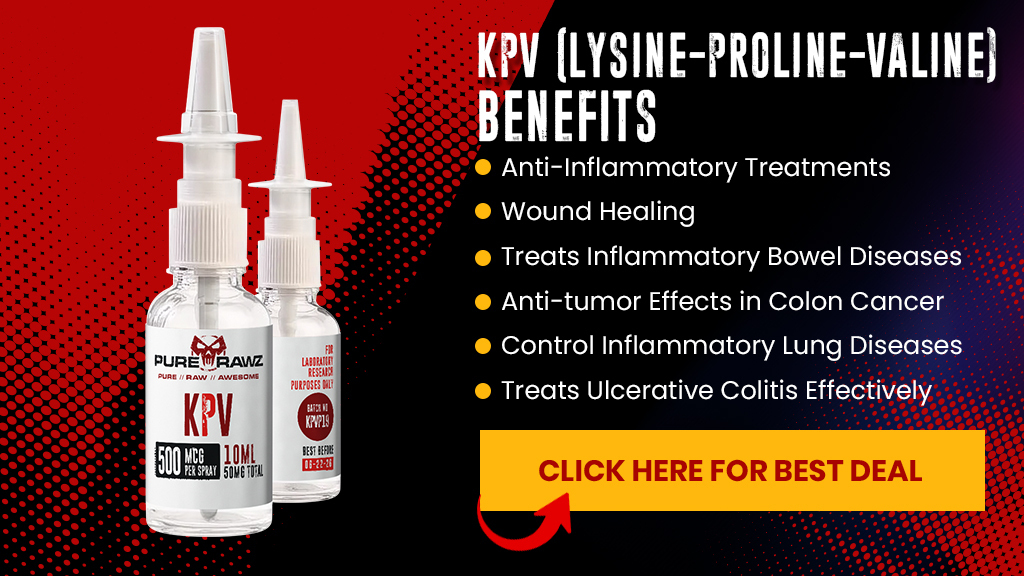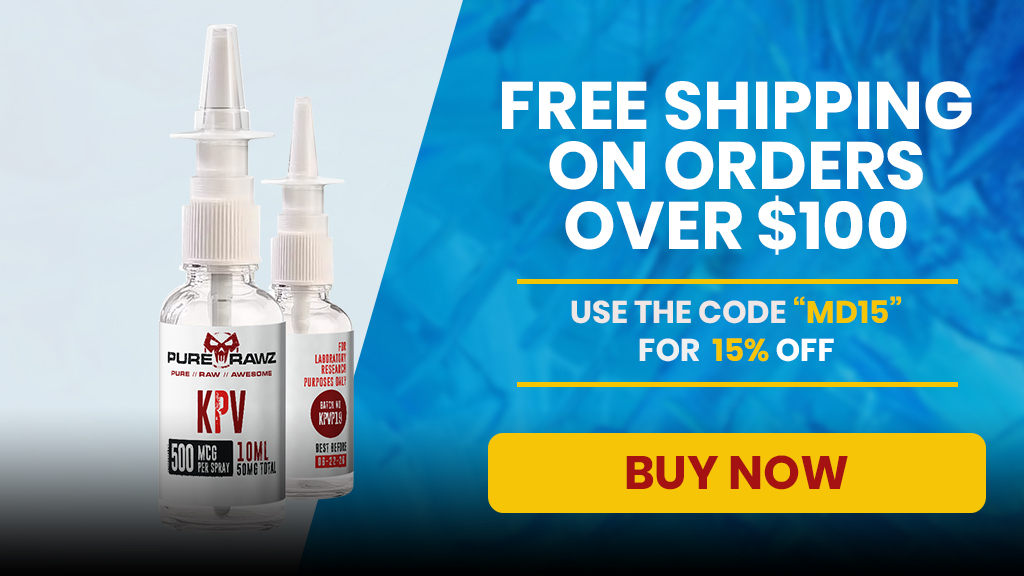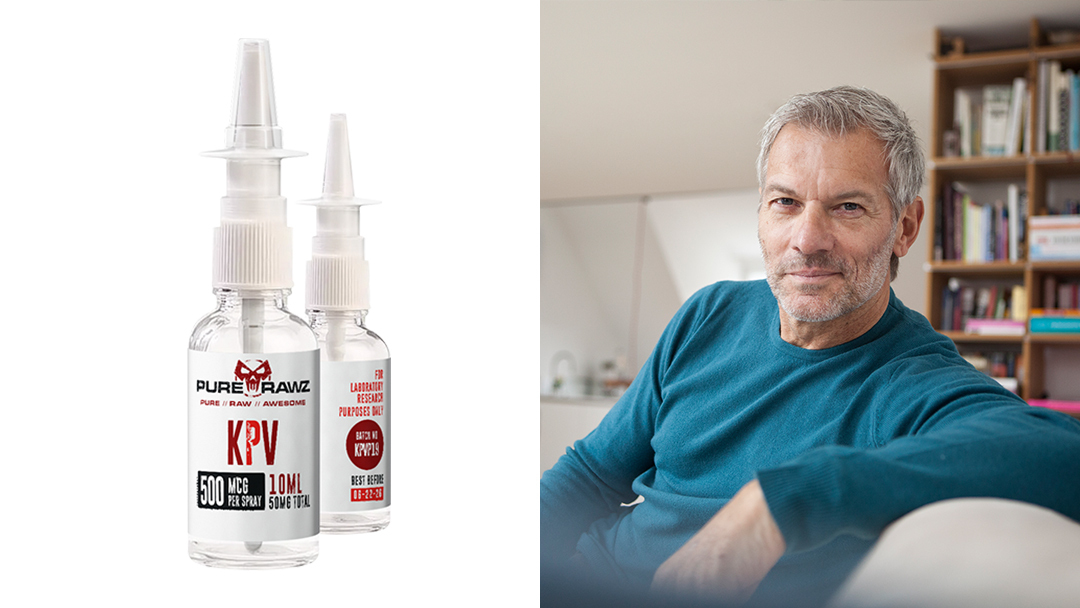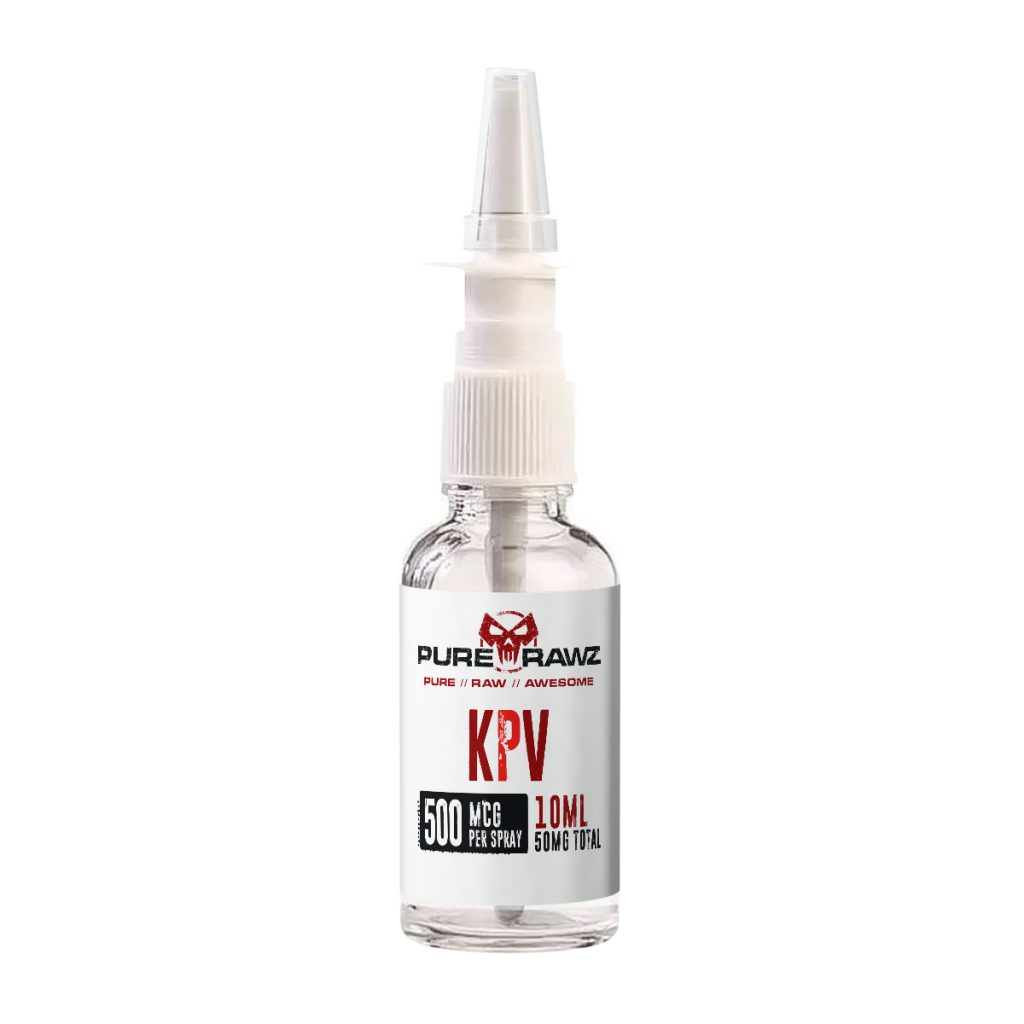Inflammations of all kinds have been on the rise, and the pain they can cause can often prevent us from going about our normal lives. In the attempt to find effective treatments for inflammatory diseases, a single medicine administered via nasal spray has recently emerged as a frontrunner. KPV peptides could offer an approach to straightforwardly implementing powerful anti-inflammatory properties.
Introduction
KPV is a short peptide made up of the last 3 amino acids – lysine, proline, and valine – of the hormone alpha-melanocyte stimulating hormone (α-MSH). α-MSH binds to melanocortin receptors in the skin and has strong anti-inflammatory effects. Research shows the end segment KPV retains the anti-inflammatory properties of the full α-MSH hormone. With a molecular weight of 383.49 daltons and an isoelectric point of 8.14, KPV offers targeted anti-inflammatory activity without the other effects of α-MSH. By leveraging the key active portion of the natural hormone, KPV may provide targeted treatment for inflammatory skin conditions.[R]
Product Information:
The proprietary formula allows KPV to be absorbed directly into the bloodstream under the tongue. This means faster, more complete absorption compared to traditional capsules. The spray makes it simple to administer the precise KPV dose needed to combat inflammation. Just a few sprays per day can help reduce swelling and irritation associated with conditions like IBD. The cooling peppermint flavor also provides a pleasant sensory experience. Additionally, the spray applicator avoids fillers and makes dosage adjustments easy. If you’re looking to unlock the health benefits of KPV peptide, this innovative oral spray is the most direct, effective delivery method.
How Does It Work?
The inflammation commonly involves mast cell system stimulation that causes skin conditions like psoriasis and dermatitis and is often treated with steroid creams. However, steroids can have side effects. A new approach is using a peptide called KPV to reduce inflammation by targeting natural receptors in the skin.
KPV is made up of 3 building blocks of a hormone called alpha-MSH. KPV doesn’t directly attach to the receptors that alpha-MSH binds to. However, it can still reduce inflammation by blocking a protein called interleukin-1beta. KPV activates the skin’s receptors to reduce swelling and redness. And unlike alpha-MSH, KPV doesn’t change skin color. Delivering KPV right to the skin may help treat inflammation without the side effects of steroids. By working with the skin’s natural receptors, KPV offers a new way to manage inflammatory skin diseases.[R]
Image source: Wikipedia
KPV (Lysine-Proline-Valine)- Benefits:
KPV (Lysine-Proline-Valine) has undergone extensive clinical research and clinical trials, exploring its potential health benefits, especially in the context of inflammation. We’ve compiled some of the benefits below:

1. Anti-Inflammatory Treatments
The hormone α-MSH contains a tripeptide called KPV that has powerful anti-inflammatory effects. Research shows KPV can reduce swelling and irritation without the side effects of other anti-inflammatory treatments.
KPV works by blocking pathways that trigger inflammation. It prevents the activation of NF-kB, a key inflammation switch. KPV also stops inflammatory cells from multiplying and moving to inflamed areas. In studies, KPV eased inflammation in skin, eye, bowel, and joint conditions. The tripeptide also showed benefit in asthma and inflammatory bowel disease models. Unlike α-MSH, KPV does not alter skin color. Its small size makes it stable and suitable for targeted delivery. With potent effects and favorable properties, KPV holds promise as a novel therapeutic for varied inflammatory diseases.[R]
2. Wound Healing
The process of wound healing is intricate and demands the coordinated involvement of numerous cells and factors. By binding to melanocortin receptors located on numerous types of skin cells, the hormone α-MSH modulates healing-related inflammation, immune responses, and collagen production. In recent times, truncated forms of α-MSH, such as the tripeptide KPV, have demonstrated anti-inflammatory properties while remaining pigmented in the skin.
Similar derivatives to KPV hold great potential as therapeutic agents for wound healing. They may facilitate the restoration of tissue integrity by promoting regenerative processes and restoring inflammation balance. By minimizing pigment-related side effects, KPV has the potential to offer targeted support devoid of adverse effects. Additional investigation using various experimental models is necessary; however, these melanocortin peptides have already demonstrated promise as therapeutic agents for promoting ulcer healing and wound closure. Due to their receptor activity in the skin, they are highly suitable to accelerate wound healing.[R]
3. Treats Inflammatory Bowel Diseases
New research shows the small protein KPV may help treat inflammatory bowel disease (IBD). KPV uses a transporter called PepT1 to get inside the gut and immune cells. This lets KPV reduce inflammation.
Studies found that KPV blocks inflammation pathways and lowers inflammatory proteins linked to IBD when given orally. KPV was able to decrease gut inflammation and damage in colitis models by using PepT1. At very low doses, KPV can access cells and calm inflammation. These early findings suggest KPV has potential as a novel IBD therapy.[R]
4. Anti-tumor Effects on Colon Cancer
Research shows the peptide transporter PepT1 plays a role in colitis and related colon cancer development. When overactive, PepT1 promotes tumor growth and intestinal inflammation. However, the anti-inflammatory peptide KPV uses PepT1 to enter cells and block cancer pathways.
Studies found giving KPV prevented colon cancer in normal mice by utilizing PepT1. However in mice without PepT1, KPV lost this protective effect. PepT1 levels were also elevated in human colon cancer tissue. These findings suggest PepT1 helps drive cancer, while KPV piggybacks on PepT1 to exert anti-tumor effects. Targeting PepT1 with KPV may offer a new therapeutic strategy for managing colitis-associated colon cancer. More research is still needed, but exploiting PepT1 with natural peptides like KPV shows promise for controlling inflammation and cancer risk.[R]
5. Control Inflammatory Lung Diseases Like Asthma
The peptide KPV shows promise for reducing lung inflammation typical in asthma. Studies find that KPV blocks inflammatory signaling in airway cells. It does this by interfering with the movement of the protein p65RelA which activates inflammation.
KPV enters airway cells and stabilizes IκBα which normally inhibits p65RelA. This keeps p65RelA out of the nucleus where it stimulates swelling and mucus production. Without active p65RelA, KPV effectively suppresses chemokines that attract inflammatory cells to the lungs. The related peptide γ-MSH also decreases lung inflammation through melanocortin receptors instead of directly blocking p65RelA-like KPV. Either approach may help control inflammatory lung diseases like asthma. [R]
6. Treats Ulcerative Colitis Effectively
Delivering drugs only to intestinal cells affected by ulcerative colitis is challenging. A new approach uses nanoparticles loaded with the anti-inflammatory peptide KPV. Coating the nanoparticles with hyaluronic acid helps achieve rapid absorption and target delivery to key cells in the colon.
Studies found these nanoparticles successfully brought KPV inside colon and immune cells without harming healthy intestinal tissue. The inflammatory signaling molecules released KPV once inside cells to tamp down inflammation. In mouse colitis models, KPV nanoparticles in a hydrogel dramatically reduced TNF-alpha production and prevented colon damage better than KPV alone. The hydrogel kept the nanoparticles in the colon so KPV could act locally. Targeting cells with anti-inflammatory KPV nanoparticles may provide a safer, more effective ulcerative colitis therapy and give a normal immune balance. [R]
Side Effects:
There are no known negative effects of KPV. Animal studies have shown the safety and efficacy of KPV when given via oral, intravenous, subcutaneous, and transdermal modes of administration. KPV supplements, however, are not yet approved by the FDA.
Oral administration of KPV peptide has been reported to be safe and effective in several studies. Moreover, unlike alpha-MSH, KPV has not been linked to skin pigmentation.
Organic peppermint flavor, organic gum acacia, organic citric acid, organic monk fruit extract, organic sugar cane, organic ethyl alcohol, and organic guaiazulene (from acacia trees), may be included in KPV peptide formulations. Therefore, those who suffer from food allergies should be cautious.
Is KPV (Lysine-Proline-Valine) legal?
Lysine, proline, and valine (KPV) have varying legal standing around the world. In some places, these peptides may be regarded as legal for research purposes, while in others, they may be controlled or even forbidden. Keep in mind that the laws governing the availability of these substances can shift over time and that they may be regulated differently depending on where you live. Animal studies have shown the safety and efficacy of KPV when given via oral, intravenous, subcutaneous, and transdermal routes of administration. However, the FDA has not yet approved KPV supplements.
The Food and Medication Administration has been unable to locate any data on KPV-containing medication items that have been administered to humans. When it comes to whether or not KPV would be harmful if given to humans, the FDA just doesn’t have enough knowledge to make an informed decision.
Suggested Dose
Standard dosage forms for KPV pills are two 250mg capsules should be taken twice daily, with or without sustenance, until the condition is cleared. Daily quantities may reach 2000 mg, depending upon the patient’s condition and the underlying medical concern. For subcutaneous use, each daily injection should contain between 200 and 500 micrograms.
KPV (Lysine-Proline-Valine) is typically administered topically via subcutaneous injection or ointment. Limited research has been conducted to ascertain the safety and effectiveness of nasal sprays containing this peptide. Since nasal administration necessitates caution, it is advisable to commence with a minimal dose of approximately 500 mcg per spray.
Where to Buy Online
To buy KPV (Lysine-Proline-Valine) nasal spray, PureRawz emerges as the ideal destination. As a leading supplier of research chemicals, both online stores consistently offer reference materials alongside each product or research chemical in their inventory

Conclusion:
KPV (Lysine-Proline-Valine) is a peptide derived from the hormone α-MSH. It has demonstrated anti-inflammatory, wound healing, and anti-tumor properties, making it a promising therapeutic agent for a range of inflammatory diseases. KPV’s ability to directly block inflammatory signaling pathways and reduce inflammation without the side effects of other anti-inflammatory treatments makes it particularly attractive.KPV has shown potential in treating various inflammatory conditions, including inflammatory bowel disease (IBD), asthma, and ulcerative colitis. Studies have indicated that KPV can effectively reduce gut inflammation and damage in colitis models, block inflammatory signaling in airway cells, and suppress inflammation in colon and immune cells without harming healthy intestinal tissue.
KPV’s anti-inflammatory properties extend to wound healing processes as well. By modulating inflammation and promoting collagen production, KPV may accelerate wound healing and restore tissue integrity. Additionally, KPV’s anti-tumor effects in colon cancer have been linked to its ability to block cancer pathways and control tumor growth.
Overall, KPV emerges as a versatile and promising therapeutic agent with the potential to address a wide spectrum of inflammatory diseases. Its targeted action, favorable side effect profile, and ease of administration make it an attractive option for further development and clinical evaluation


